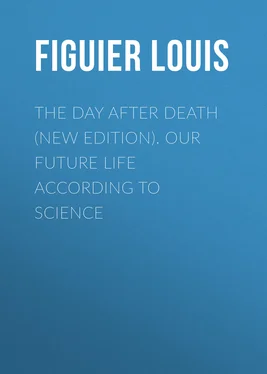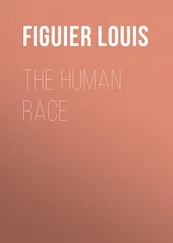Louis Figuier - The Day After Death (New Edition). Our Future Life According to Science
Здесь есть возможность читать онлайн «Louis Figuier - The Day After Death (New Edition). Our Future Life According to Science» — ознакомительный отрывок электронной книги совершенно бесплатно, а после прочтения отрывка купить полную версию. В некоторых случаях можно слушать аудио, скачать через торрент в формате fb2 и присутствует краткое содержание. Жанр: Эзотерика, foreign_religion, foreign_antique, foreign_prose, на английском языке. Описание произведения, (предисловие) а так же отзывы посетителей доступны на портале библиотеки ЛибКат.
- Название:The Day After Death (New Edition). Our Future Life According to Science
- Автор:
- Жанр:
- Год:неизвестен
- ISBN:нет данных
- Рейтинг книги:5 / 5. Голосов: 1
-
Избранное:Добавить в избранное
- Отзывы:
-
Ваша оценка:
- 100
- 1
- 2
- 3
- 4
- 5
The Day After Death (New Edition). Our Future Life According to Science: краткое содержание, описание и аннотация
Предлагаем к чтению аннотацию, описание, краткое содержание или предисловие (зависит от того, что написал сам автор книги «The Day After Death (New Edition). Our Future Life According to Science»). Если вы не нашли необходимую информацию о книге — напишите в комментариях, мы постараемся отыскать её.
The Day After Death (New Edition). Our Future Life According to Science — читать онлайн ознакомительный отрывок
Ниже представлен текст книги, разбитый по страницам. Система сохранения места последней прочитанной страницы, позволяет с удобством читать онлайн бесплатно книгу «The Day After Death (New Edition). Our Future Life According to Science», без необходимости каждый раз заново искать на чём Вы остановились. Поставьте закладку, и сможете в любой момент перейти на страницу, на которой закончили чтение.
Интервал:
Закладка:
We can also arrive at some idea of the perfection of the senses attained by resuscitated man, by considering the accession of power which our own senses may receive by the assistance of science and art. Before the invention of the microscope, no one ever imagined that the eye could penetrate the mysteries of that world in miniature well named the Infinitely Little , until then absolutely unknown; no one had ever divined, for instance, that in one drop of water might be seen myriads of living beings. These beings have existed throughout all time, but man has been able to contemplate them for only two centuries. Our visual power over microscopic beings was until then unknown. The least enlightened, the most careless student of this day, regards with indifference things which Aristotle, Hippocrates, Pliny, Galienus, Albertus Magnus, and Roger Bacon could not have contemplated, or even suspected to exist. The discovery of the telescope, in the days of Kepler and Galileo, hurled back the boundaries of the human intellect and threw open to its investigation a domain hitherto sealed from its sight. There, where Hipparchus and Ptolemy had seen nothing, Galileo, Huyghens, Kepler, made, in a few nights, by the aid of the telescope, discoveries of hitherto unsuspected celestial splendour. The satellites of Jupiter and Saturn, a multitude of new stars, the phases of Venus, and, at a later period, the discovery of new planets only to be seen by the telescope, the observation of spots on the sun, and the revolution of the nebulæ into collections of stars, were the almost immediate consequences of the invention of the telescope. Thus we learned that, by the aid of art, the human eye can penetrate the most distant regions of heaven.
Let us now suppose all the powers of the telescope and all those of the microscope concentrated in the sense of vision; that is to say, that in addition to all objects placed at ordinary distances, it can discern all microscopic objects, and at the same time all the celestial bodies invisible to the naked eye, and you will have an idea of what the sense of sight is, in the superhuman being.
There is no occasion to dwell upon the extraordinary proportions which our accumulated knowledge would assume, if our sight could enjoy those extraordinary powers of extension, if it could perform simultaneously the functions of the telescope and the microscope. Science would march forward with the tread of a giant. What enormous progress would be made by chemistry if our eyes could penetrate into the interior of all bodies, beholding their molecules, estimating their relative volume, their arrangement, and the form and colour of their atoms. A glance would reveal to us secrets of chemical solutions such as the genius of a Lavoisier could not penetrate. Physics would contain no further mysteries for us, for we should know, by simply using our eyes, everything which we are now painfully striving to divine by reason, and by the aid of difficult and uncertain experiments. We should see why and how bodies are warmed and acquire electricity. We should have the explanation of the mathematical laws in obedience to which the physical forces, light, heat, and magnetism are exercised. Our eyes would suffice for the solution of those physical and mechanical problems before which the genius of such men as Newton, Malus, Ampère, and Gay-Lussac stands still.
We do not doubt that the superhuman being is endowed with sight thus marvellously perfect.
We might carry this argument out in detail, applying it to all the other senses, but enough has been said to illustrate the exaltation and perfecting of those senses which man possesses only in their rudiments, in the favoured dwellers in a superior sphere. We will only add, that the result of such a degree of perfection of the senses is, that the superhuman being can move with a rapidity, of which light and electricity only can give us some notion, that is to say, that these perfected senses can be used at great distances, and with great promptitude. If the entire body of the superhuman being can transport itself with wonderful rapidity from one place to another, as we have already admitted, his senses can also act from, and at great distances. We do not think we can err in comparing the actions of the dwellers in the invisible world which we presume to investigate, with the phenomena of light and electricity.
Does sex exist in the superhuman being? Assuredly not. The Christian religion defines its absence in the angel. The angel of the Christian creeds has the features of either man or woman, the mild face of a youth, or the pathetic beauty of a girl. Sex is suppressed, the individual is androgynous. Thus, too, it must be in the case of the superhuman being. The reciprocal affection which reigns among the blessed dwellers in the ether does not require diversity of sex.
The affections undergo a purifying process, according as they are elevated, from those of the animals to those of man. The animals have but little of the sentiment of friendship. Love, with its material impulses, is almost all they know. The sentiments of affection possessed by animals, apart from their carnal instincts, reduce themselves to those of maternity, which are strong and sincere, but of short duration. Their young are the objects of attentive care and caresses while their helplessness demands such aid, but as soon as they can live on their own resources they are abandoned by the mothers, who no longer even recognize them. There is no constant, lasting affection in animals, except the sentiment of love, which is caused by their sexual necessities. The sentiments of affection entertained by man are numerous, and frequently noble and pure. We love our mothers and our sons as long as our hearts beat in our breasts. We love our brothers, our sisters, and our relations with a sentiment in which there is nothing carnal, and which is deeply rooted in the soul. If love is often inseparably attached to physical desires, it can, nevertheless, shake itself free from them, and a disinterested friendship frequently survives the extinction of sensual feeling. In this respect we are far superior to the animals. Let us go a step further, even to the supernatural being, the next link in the chain to ourselves, and we shall find the sentiment of affection entirely detached from the consideration of sex. In that sublime and blessed realm which they inhabit, superhuman beings are all of the same organic type. They need not, in order to love one another, to belong to two opposite sexes, or different groups of organization: their tenderness is the result of the serenity of the infinite purity of souls, of the sympathy evoked by common perfections.
On the other hand, the ethereal region which awaits us is the scene of the reunion of those who have loved one another in this world. There the father will find the son, and the mother will rejoin the daughter, torn from each by death, there husbands and wives will meet, and the separation of friends come to an end. But, under their new form, in the perfected body wherein their regenerated souls shall dwell, there is no more sex, and love is for all an ideal, noble, and exquisitely pure sentiment.
How blind and self-interested is love here below! How narrow and egotistical a sentiment is friendship. It cannot enlarge itself without pain and difficulty, to embrace the totality of the human kind. Why is it so hard for it to lift itself up to the sublime Creator of the worlds? Why do we not love God as we love our neighbours? In the upper world it will be far otherwise. Our faculty of loving, limited here by fleshly bonds, will be set free there, from every sensual restraint. Man, resuscitated to glory, will love his wife as he loves his children, his friends, and his brethren. His affections will never more be degraded by his senses. The happiness which this purified sentiment, constantly received from ever living sources, will afford him, will suffice to fill and satisfy his soul. His power of loving will be extended to all nature, it will be spread abroad over the most elevated spheres; his soul will be exalted by the sublime sensations of this universal love, this wide sympathy with the whole creation. True charity, comprehending the entire universe, will burn in all hearts. The love of God will rule over all these multiplied affections, from the height of His infinite power, and the fervour of our sentiments of love for our kind will be crowned by our sublime adoration of the Creator of all.
Читать дальшеИнтервал:
Закладка:
Похожие книги на «The Day After Death (New Edition). Our Future Life According to Science»
Представляем Вашему вниманию похожие книги на «The Day After Death (New Edition). Our Future Life According to Science» списком для выбора. Мы отобрали схожую по названию и смыслу литературу в надежде предоставить читателям больше вариантов отыскать новые, интересные, ещё непрочитанные произведения.
Обсуждение, отзывы о книге «The Day After Death (New Edition). Our Future Life According to Science» и просто собственные мнения читателей. Оставьте ваши комментарии, напишите, что Вы думаете о произведении, его смысле или главных героях. Укажите что конкретно понравилось, а что нет, и почему Вы так считаете.












